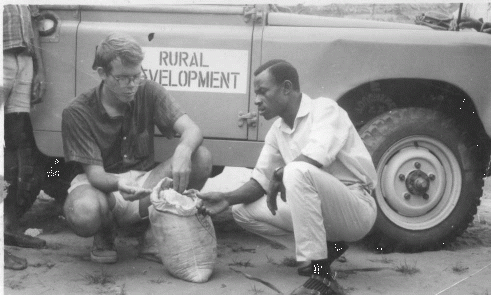Rice Demonstration Project
From Rpcvdraft
Story 2
My most troublesome project, little did I know it was worth the effort.
This was a rice demonstration project run by the Ministry of Agriculture (MOA), part was in INI County Council, Ikot Ekpene Division, Annang Province. It used land that belonged to 2 villages, each village was in a difference Province. I was asked to settle disputes between the villages and the villages and MOA that reguarded the project.
Just prior to my arrival, day laborers at the site were chased off by a group of unhappy people with light weapons. MOA employed 40 to 60 people, was constructing a large bund (levee) and had created 30 acres of rice paddies in a former swamp. Rice had not been grown in this region before. Frankly, I had to be talked into involving myself in what was clearly a volatile land dispute.
Unlike the 12 oil palm community farms I worked with in Ikot Ekpene Division, this demonstration project was "high maintenance". It required constant attention to the social and economic divisions of resources between the parties. Every small issue I had dealt with in the community farms and other projects, repeated themselves in this demonstration project. Fortunately, I had the full support of both Provinces, and the Ministry of Agriculture at the highest levels.
There are lots of stories in my mind about this project. Being asked to remove juju from part of the project, dividing land with 40 unhappy men waving machetes in the air, contrasting the leader of each village (an okuku and a politician), and others.
The big story was what happened between the time I was evacuated in 1967 and my visit to Ikot Ekpene in 1972. The divisional office had just reopened within the month when I introduced myself and asked after 'my village projects'. "We remember what you did. It was the rice project that was the most important in the time of Biafra." The roughly 100 acres of rice turned into over 1000 acres at that site and another site had another 600 acres growing. As sort of an after thought, I was told that 8 of the 12 community farms were still being kept up without any government supervision.
Still amazes me, what a special time in Ikot Ekpene was for me and evidently how Peace Corps Volunteers had some kind of positive impact upon on the daily lives of people in Nigeria. By contrast, my in Somalia was completely different.
--Rcollman 10:49, 2 November 2007 (EST)

